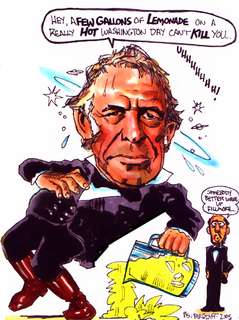Zachary Taylor
(Not to be confused with The Presidents of the United States of America)
James K. Polk ← Zachary Taylor → Millard Fillmore

"Old Rough And Ready," who served in three wars. According to legend, he was elected without ever having voted before. He also died soon after taking office- to quote Badass of the Week: "One of the toughest, most badass generals and commanders in American history was replaced by some dude named Millard."
He was the second president to die in office--the cause of death was at the time said to be a bowl of cherries that were cooled with contaminated ice, but even at the time of his death people were suspicious that he had been poisoned with arsenic. In 1991 they dug him up and tested his hair for arsenic. The test came out normal, but at least one medical doctor has pointed out that the test was improperly administered - instead of testing just the very tip of the hair root, they mashed up the entire hair and tested it. This would uncover chronic poisoning but would at best be useless in discovering acute poisoning. (At worst it would actually mask any evidence.)
He was also the second member of the Whig party to be elected president, the first being William Henry Harrison, who lasted all of 31 days. For some reason, the Whig party isn't around anymore. For what it's worth, Taylor is widely considered to have been the best Whig president by a country mile, simply because he was around long enough to get a few positive things done, while not lasting long enough to become a total screw-up.
His rough and dirty exterior hid his political savvy. He was also well connected out the wazoo. Former president James Madison and General Robert E Lee were his cousins and Mississippi Senator Jefferson Davis was his son-in-law. It was in his administration that slavery consumed American politics. He was an ardent Unionist (paraphrased: "I'll hang every secessionist there is, starting with that son-in-law of mine.") and he was willing to use force to prevent secession.
Taylor deferred his inauguration for a day because declined to take the oath of office on Sunday. This later gave rise to the notion that David Rice Atchison (president pro tempore of the outgoing Senate, that being the office next in line after the President and Vice President by the succession law of the time) was "President for a day" (specifically, March 4, 1849). A short list of reasons why this isn't so:
- The previous session of Congress, and therefore Atchison's office of president pro tempore of the Senate, had expired the previous day.
- Strictly speaking, the President doesn't have to take the oath of office before assuming the office, only before executing it (i.e. using Presidential powers).
- Even if you argue that Taylor wasn't President yet because he hadn't taken the oath... well, Atchison didn't take it either, so there.
A one-minute biography can be found here.